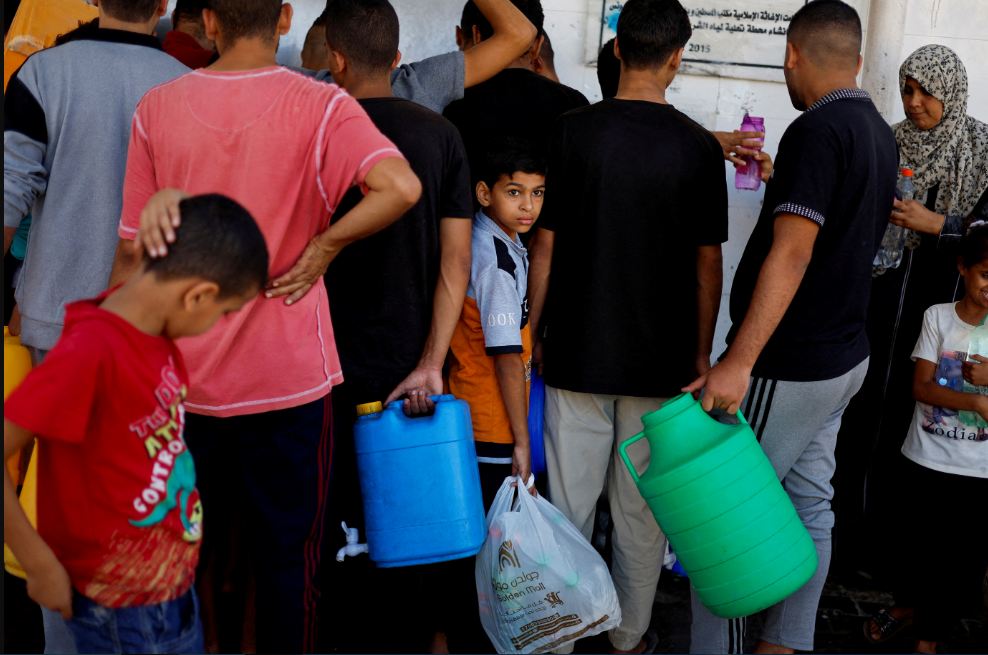Exclusive: Americans want US to help get Gaza civilians out of harm’s way-Reuters/Ipsos poll
Washington (Reuters) – A bipartisan majority of Americans wants the U.S. to help get Palestinian civilians out of harm’s way in Gaza amid Israel’s war against Hamas militants, but the American public’s support for Israel in the conflict appears stronger than in the past, a Reuters/Ipsos poll found.
The results of the two-day poll, which closed on Friday, showed 78% of respondents – including 94% of Democrats and 71% of Republicans – agreed with a statement that “American diplomats should actively be working on a plan to allow civilians fleeing fighting in Gaza to move to a safe country.”
Twenty-two percent of respondents disagreed.
Hamas fighters burst across the Gaza barrier fence into Israel in a stunning assault on Oct. 7, killing 1,300 and abducting dozens more, including Americans. Israel has responded with the most intensive air strikes of its 75-year-old conflict with the Palestinians, killing at least 2,670 and sparking a humanitarian crisis.
U.S. and global media have been awash with images of massacred Israelis, including graphic accounts of Hamas atrocities, as well as Palestinians in the Gaza Strip searching for survivors after Israeli airstrikes leveled neighborhoods.
Support among Americans for Israel’s position in the conflict was higher in the new poll than it was in a survey in 2014, when Israeli ground forces surged into coastal enclave in a clash with Hamas aimed at stopping rocket fire into Israel. The current war has escalated into a much more serious, far-reaching conflict.
Forty-one percent of respondents in the new poll, which closed as Israel, Washington’s closest Middle East ally, was preparing a ground invasion into Gaza, said they agreed with a statement that “the U.S. should support Israel” in its conflict with Hamas, while 2% said “the U.S. should support the Palestinians.”
In a Reuters/Ipsos poll conducted during the 2014 conflict, 22% of respondents said the U.S. should support Israel’s position, and 2% wanted support for Palestinian’s position.
Support for Israel’s position in the new poll was strongest among Republicans, with 54% of the party backing Israel’s position compared to 37% of Democrats.
In recent years, Democrats have grappled with internal friction between pro-Israel moderates and a faction of progressives increasingly critical of Israel, especially for its treatment of the Palestinians and expansion of Jewish settlements by the country’s far-right government.
Younger Americans Less Suppportive Of Israel
Large shares of respondents in the poll backed other stances in the conflict, including 27% who said the U.S. “should be a neutral mediator” and 21% who said the U.S. shouldn’t be involved at all.
Some 40% of respondents under age 40 said the U.S. should be a neutral mediator, roughly double the 19% of people age 40 and above who said the same.
Those under 40 were also less likely to back supporting Israel than were older Americans, a potentially worrisome sign for Israel, which has long counted on Washington for weapons aid and international diplomatic support. Some 20% of respondents under 40 backed supporting Israel, compared to 53% of older respondents.
The poll results illustrated a high level of concern among Americans over the plight of ordinary Palestinians in the Hamas-ruled territory of more than 2 million people.
Eighty-one percent of respondents agreed with a statement that “Israel should avoid killing civilians in its retaliatory strikes against Hamas,” compared to 19% who disagreed.
U.S. officials have urged Israel to protect civilians while pointing the finger directly at Hamas, which Washington designates a terrorist group, for what they describe as using Gaza residents as human shields. Israel has insisted its military takes every precaution to minimize civilian casualties.
As the deaths mount, no neighboring state or other third country so far has shown any willingness to take in large numbers of Gaza refugees.
But U.S. Secretary of State Antony Blinken said on Sunday the Egyptian-controlled Rafah border crossing in southern Gaza would reopen and the U.S. was working to get humanitarian assistance through it to ease the crisis. The U.S. on Saturday advised its 500 to 600 dual-nationals in Gaza to move closer to the crossing for possible safe passage into Egypt.
Israel has imposed a blockade around the rest of the strip.
The Israeli military sparked an international outcry last week when it ordered all residents of Gaza City to evacuate, but hundreds of thousands have already fled south.
Some 69% of poll respondents said they were following news about the fighting “very closely” or “somewhat closely.”
When presented with a list of options for who is most responsible for the current conflict, 49% of respondents picked Hamas, far more than the 9% who picked Israel.
The war, which threatens stability in a region that is critical for global energy supplies, could be a significant political issue as U.S. President Joe Biden seeks re-election in 2024.
While Biden has offered staunch support for Israel, he has also urged it to follow the laws of war. On Sunday, he said on social media that “the overwhelming majority of Palestinians had nothing to do with Hamas’ appalling attacks.”
Biden’s predecessor, Donald Trump, the frontrunner for the Republican nomination to challenge Biden in the election, criticized Israeli Prime Minister Benjamin Netanyahu for a lack of preparation for the Hamas attack, saying “they’ve gotta straighten it out.”
The Reuters poll showed Americans have little faith in the ability of either Biden or Trump to solve the crisis. Just 26% of respondents said they trusted Biden more “to broker peace in the Middle East,” compared to 32% who picked Trump. The rest said they didn’t trust either or didn’t know who would be better.
The Reuters/Ipsos poll was conducted online and nationwide, gathering responses from 1,003 U.S. adults. It had a credibility interval, a measure of precision, of about four percentage points.



